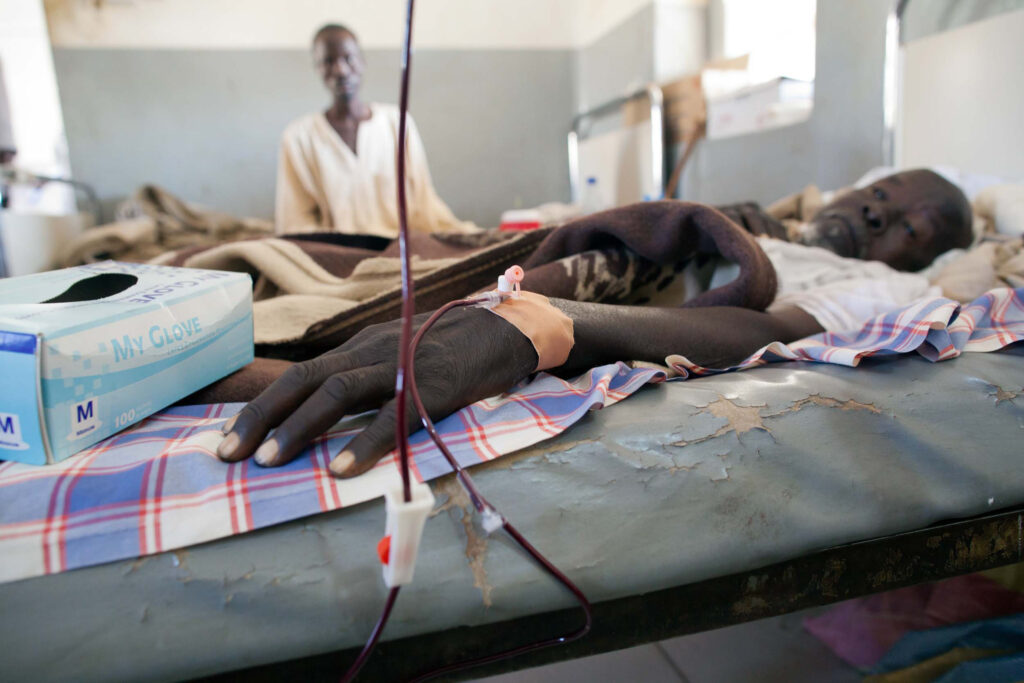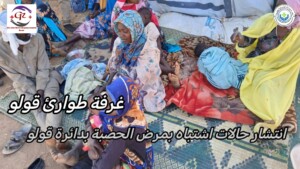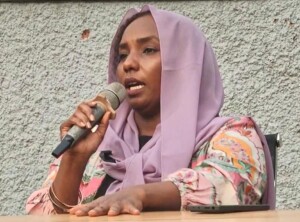Sudanese doctors decry US travel ban

A patient receives a blood transfusion at a hospital in El Fasher, North Darfur, in 2012 (File photo: Albert González Farran / UNAMID)
Sudanese doctors have raised alarm after the newly implemented US travel ban, signed by President Donald Trump, came into effect on June 9, barring Sudanese nationals from entering the United States.
The Sudanese American Physicians Association (SAPA) warned that the ban threatens the futures of 80 recent medical graduates from Sudan, who were due to begin residency and fellowship training programmes in the US on July 1.
The group said the decision undermines the role of Sudanese healthcare professionals and disrupts vital international training pathways.
“Sudanese doctors currently in the US on J-1 visas may also be prevented from reuniting with their families abroad,” SAPA stated.
The J-1 visa is a non-immigrant visa that allows foreign nationals to take part in approved exchange programmes in the US for purposes such as teaching, studying, research, or training.
The association pledged to offer immediate and tailored support to affected members, including legal guidance, advocacy, and updates on the unfolding situation.
SAPA confirmed it is working closely with legal and immigration experts, as well as the Committee of Interns and Residents, to mitigate the fallout for Sudanese physicians.
“We are committed to defending the rights of our colleagues and ensuring they are not exposed to unnecessary risks,” the group said.
The Trump administration cited national security concerns, claiming Sudan lacks reliable identity verification systems and pointing to high visa overstay rates. Sudan joins 11 other countries facing full travel restrictions, including Afghanistan, Iran, and Somalia.
The announcement echoed Trump’s 2017 travel ban, widely known as the “Muslim ban”, which faced legal challenges but was ultimately upheld by the US Supreme Court. That policy initially targeted several Muslim-majority countries and was later expanded.
AU Commision
The African Union Commission also weighed in, expressing concern over the sweeping restrictions. While acknowledging every state’s right to safeguard its borders, the AU urged Washington to implement such measures in a “balanced and evidence-based manner”.
In their statement last week, the AU also warned that the ban could undermine decades of diplomatic progress and damage crucial people-to-people, educational, and commercial ties between Africa and the United States.
The International Rescue Committee (IRC) criticised the new US travel restrictions, stating: “At a time when conflicts in places like Ukraine and Sudan are displacing millions, the U.S. should be providing refuge—not closing its doors.”
As the ban begins to disrupt lives and careers, especially among Sudanese healthcare workers contributing to the American medical system, SABA has vowed to continue its advocacy and outreach.
“The Sudanese American medical community has long been part of the solution,” the association said. “We will not stand by as our professionals are sidelined by a policy that undermines both justice and public health.”
‘New York Bar demands Darfur action’
The New York City Bar Association issued a statement yesterday, calling for urgent international action to address what it describes as genocide and a spiralling humanitarian catastrophe in Darfur.
Sudan’s ongoing war has seen nearly 9,000 armed clashes, widespread famine, and repeated attacks on civilians, making it “the world’s worst humanitarian crisis,” according to the New York City Bar Association.
The Bar condemned both the Sudanese Armed Forces (SAF) and the paramilitary Rapid Support Forces (RSF), accusing them of financing their war through gold mining in Darfur and receiving backing from foreign states, including arms smuggled to the RSF via the UAE and support to the SAF from Egypt, Qatar, and Iran.
The RSF’s bombing of Zamzam Camp in El Fasher, which killed at least 38 civilians, was cited as part of a broader pattern of war crimes.
The Bar urged international actors to invoke the Responsibility to Protect doctrine and support ICC investigations into possible crimes against humanity.
It backed the US genocide determination announced in January, stressing that “the duty to prevent genocide is an erga omnes obligation [towards all]” binding on all states.
The Bar called for targeted sanctions, tighter control over gold exports to the UAE and Egypt, and an end to arms transfers.
“The right to life, safety, and dignity of the Sudanese people must remain at the core of all response efforts,” it concluded.
Read the full New York City Bar Association report here: STATEMENT ADDRESSING THE ESCALATING AND URGENT HUMANITARIAN CRISIS AND GENOCIDE IN DARFUR, SUDAN











 and then
and then